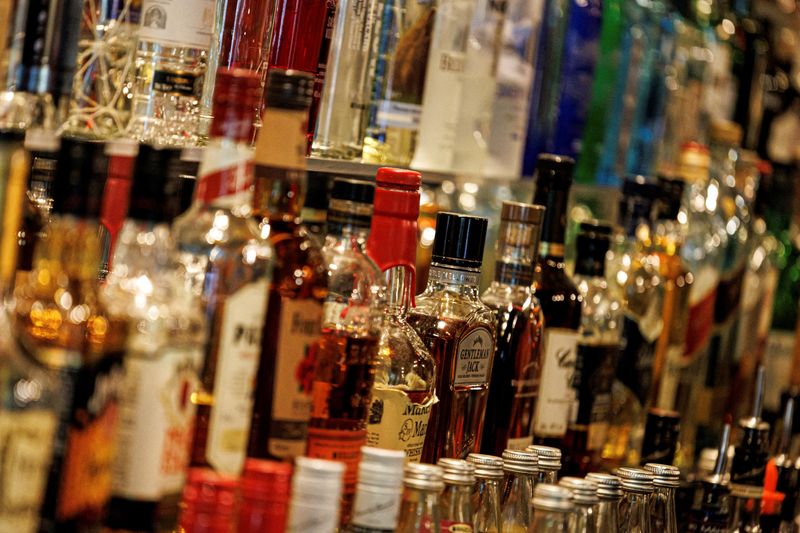(Reuters) - The U.S. Surgeon General called on Friday for alcoholic drinks to carry a label warning consumers about their cancer risks.
Here are some guidelines and recommendations by governments on alcohol consumption:
BRITAIN
National Health Service guidelines recommend consuming no more than 14 units of alcohol per week. The service, which is publicly funded, advises "there's no completely safe level of drinking, but sticking within these guidelines lowers your risk of harming your health."
The NHS guidance states that lower risk of cancer is one of the long term benefits of drinking less alcohol.
FRANCE
France's public health agency, Sante Publique France, recommends adults limit alcohol consumption to a maximum of two standard drinks per day and not to drink every day, according to its official alcohol recommendations last updated in 2022.
The agency states that alcohol-related health risks increase with the quantity consumed over a lifetime and advises consuming no more than 10 standard drinks per week while observing alcohol-free days each week.
The agency does not explicitly state that moderate drinking can be safe and warns on its website about cancer risks associated with alcohol consumption. It states that alcohol is a known carcinogen and the risk of developing certain forms of cancer increases from just one drink per day, regardless of the type of alcohol consumed. Seven types of cancer are proven to be linked to alcohol consumption, it says, citing mouth, larynx, pharynx, oesophagus, liver, colorectal, and breast tumours.
GERMANY
The German Center for Addiction Issues recommends that women drink no more than 12 grams of alcohol per day, equivalent to a small beer or a small glass of wine, and that men drink no more than 24 grams of alcohol per day, equivalent to two small beers or a large glass of wine. The Center also recommends at least two alcohol-free days per week.
A government website advising the public on responsible drinking warns there is no such thing as risk-free alcohol consumption, pointing to mounting scientific studies showing that even small amounts of alcohol can contribute to physical illness.
Alcohol consumption is a cause of various forms of cancer, most commonly bowel cancer and cancers of the mouth and throat, liver, oesophagus and breast, according to a German government-funded 2022 study.
IRELAND
Under new rules coming into force next year, all alcohol products sold in Ireland face a legal requirement to carry health labelling, including warning of the links to cancer, liver disease and the risk of drinking while pregnant.
Setting out the plan in 2023, health Minister Stephen Donnelly hailed Ireland as "the first country in the world to take this step."
The World Health Organization welcomed the move then, saying Ireland will be the first country with comprehensive health labelling on all alcohol products.
LITHUANIA
Lithuania's strict alcohol control laws prohibit any public encouragement to drink alcohol, including any advertising of alcohol or advertising price reduction of alcoholic beverages.
A spokeswoman for Lithuania's governmental Narcotics, Tobacco and Alcohol Control Board said she was not aware the Board was issuing any specific warnings linking alcohol to cancer.
The link between cancer and alcohol is mentioned, in passing, in at least one press statement on the Board's website.
NORWAY
Norway's Directorate of Health says there is no safe level of alcohol consumption and recommends that the intake should be "as low as possible". "Alcohol consumption is associated with the development of cancer, especially breast cancer and cancer of the gastrointestinal tract," it said in guidelines released in 2024.
SPAIN
The Spanish Health Ministry says that alcohol consumption always involves a risk, adding that "the less alcohol the better".
Low-risk drinking limits are set at half a glass of wine a day or a small glass of beer for women and a glass of wine or two small beers for men.
The Spanish Health Ministry considers a risky consumption when the person drinks at least twice the recommended amounts.
The ministry defines a risky consumption as one that increases the probability of having health problems in the future (such as cancer or mental health), including social and economic consequences for the person who drinks or others.

UNITED STATES
Alcoholic beverages in the United States currently carry a health warning label, introduced in 1988, which advises pregnant women to not drink them and that their consumption impairs a person's ability to drive a car or operate machinery.